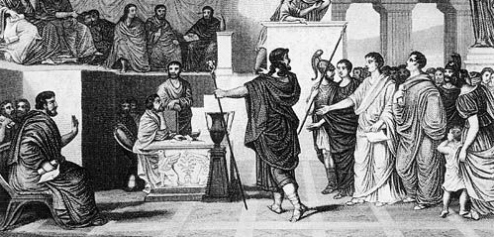All the higher magistrates had the right to issue edicts, i.e. proclamations in which they notified the people of their orders and of their intentions, each naturally within his own sphere. From the edicts of those whose duty included jurisdiction, especially from that of the praetor urbanus, there arose the ius honorarium or magisterial law, which came to be placed side by side with the ius civile arising from statute and interpretation, and was interwoven with it in a way which, in spite of important differences, may be compared with the manner in which the common law and equity have combined to make up the English legal system. In the case of the praetor and the other jurisdictional magistrates, it was the practice that the edict should be published each year when they entered upon their office and put up in a conspicuous place in the forum. As it was intended that it should be valid throughout the year, it was called perpetuum (continuous). Each praetor had, in theory, a perfectly free hand in the matter of his edict, but it became customary for him to take over and republish as his own the bulk of his predecessor's edict, making only such erasures or additions as he or his technical advisers saw fit, and there thus grew up a document of considerable size, known as the edictum tralaticium, because it was thus "carried on" from year to year; it was this document on which the jurists wrote commentaries. There was originally no compulsion on the magistrate to adhere to the intentions he had expressed in his edict; presumably the pressure of public opinion was enough, but towards the end of the republic, when, as we know from Cicero's account of Verres' misdeeds, unscrupulous magistrates did not hesitate to misuse their powers in their own or their friends' interest, a lex Cornelia of 67 B.C. was passed forbidding praetors to depart from their edicta perpetua.

The praetor was entitled to issue edicts and, in fact, these edicts were a very important source of law, but the praetor was not a legislator; he could not alter the law directly and openly as could the sovereign assembly by a
lex or a
plebiscitum, and his edict consequently did not take the same form as a statute. It consisted, on the contrary, chiefly of statements by the praetor of what he would do in certain circumstances, of the way in which he would carry out his duty of jurisdiction, and it was the great freedom he had in this respect that made it possible for him to influence the law to such an enormous extent. He would thus say that in such and such a case he would give in action (
iudicium dabo), i.e. if a man came to him with a complaint against another which did not, at civil law, give him any claim against that other for redress, the praetor might nevertheless allow him an action. Or the praetor might say that in certain circumstances he would put a man into possession of property (
possidere iubebo,
bonorum possessionem dabo), or that he would put a man back in his original position (
in integrum restituam), i.e. account some transaction, e.g. a contract into which the complainant had been induced to enter by fraud, as never having taken place, and so on. The praetor could also refuse to allow a plaintiff to proceed with his claim, though he did not as a rule announce his intention in exactly this way in the edict. The essence of the praetor's power lies in fact in his control over remedies. He does not give a right (as a law can), he promises a remedy, and once there is a remedy there is, by implication, a right also. This is perhaps most clearly seen from an example taken from the law of inheritance. If a man died intestate leaving no children and no relations, then there was, at civil law, no heir to his estate and it was open to anyone to seize the property without any fear, so far as the civil law was concerned, that any other person would be able to bring an action to get it away from him. The praetor was of opinion that in these circumstances the widow of the deceased should have a claim. He could not however assert that she was heir; at civil law she was not, and he could not alter the civil law, but he could, and did, say in his edict that he would "give her possession of the goods", i.e. that he would give her a remedy by which she could get the property of the deceased from anyone who had taken possession of it, and since there was no one who could show a better title she would be able to keep what she had got. We can thus say that by the
ius honorarium the widow had a right, although she had none at civil law, and though the praetor did not, in so many words, say that she had one at all. This is, of course, but one example of a whole complex system of
bonorum possessiones, all of which taken together from the praetorian law of succession which became engrafted on the civil law rules of
hereditas. In a similat way, as we shall see, it becomes possible to speak of praetorian ("bonitary") ownership, i.e. ownership protected by praetorian remedies in opposition to ownership strictly according to the civil law (
dominium ex iure Quiritium), and the parallelism extended throughout the whole legal system. How the civil and praetorian rules worked in with each other in practice is of course a matter for detailed study in each instance, but one famous remark on their relationship may be explained here. Papinian says that the function of the ius honorarium is to "aid, supplement or correct" the civil law. Again the system of inheritance, of which Papinian is probably thinking, helps us to see best what is meant. "Aiding" refers to the provision of praetorian remedies in addiction to those of the civil law for the use of a person who has a civil law right; thus the interdict
quorum bonorum (like all interdicts a preatorian remedy) was in many cases available for the person who was civil law heir. "Supplementing", though it is not possible to draw a hard and fast line between it and "aiding", refers especially to the granting of remedies to persons chosen according to the praetorian system in default of any who had rights at civil law, as in the case of the widow mentioned above. "Correcting" occurs when the praetor gives remedies to a person who is not entitled at civil law although there does exist someone who is so entitled, e.g. a person nominated heir in a will which satisfies praetorian but not civil law requirements will be preferred to the intestate heir, who, since the will is invalid at civil law, is by the civil law entitled to succeed.



